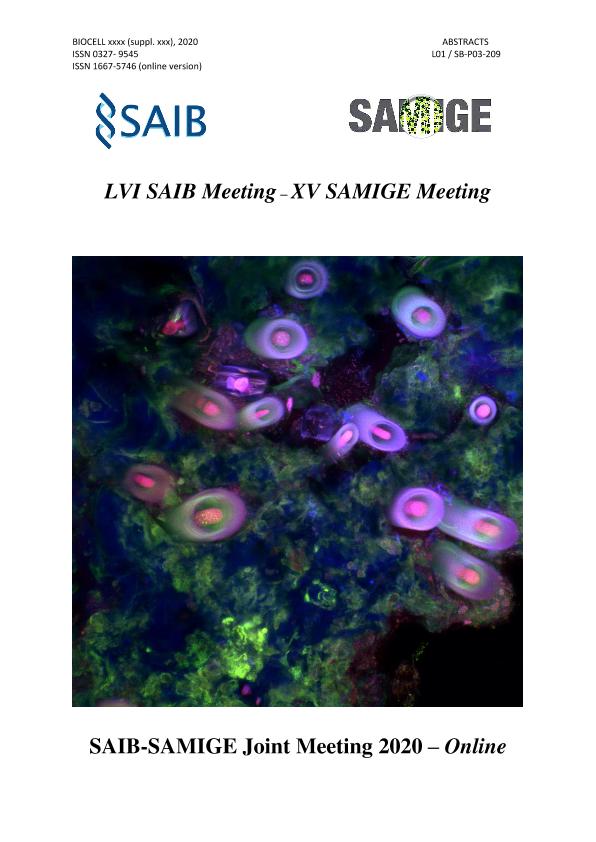Evento
In vitro immune response induced by a Salmonella Typhimurium mutant
Torres, Mariela Analía ; Leccese Terraf, Maria Cecilia
; Leccese Terraf, Maria Cecilia ; de Moreno, Maria Alejandra
; de Moreno, Maria Alejandra ; Minahk, Carlos Javier
; Minahk, Carlos Javier ; Delgado, Monica Alejandra
; Delgado, Monica Alejandra
 ; Leccese Terraf, Maria Cecilia
; Leccese Terraf, Maria Cecilia ; de Moreno, Maria Alejandra
; de Moreno, Maria Alejandra ; Minahk, Carlos Javier
; Minahk, Carlos Javier ; Delgado, Monica Alejandra
; Delgado, Monica Alejandra
Tipo del evento:
Reunión
Nombre del evento:
LVI Annual Meeting Argentine Society for Biochemistry and Molecular Biology and XV Annual Meeting Argentinean Society for General Microbiology
Fecha del evento:
02/11/2020
Institución Organizadora:
Sociedad Argentina de Investigación Bioquímica y Biología Molecular;
Sociedad Argentina de Microbiología General;
Título de la revista:
Biocell
Editorial:
Tech Science Press
Idioma:
Inglés
Clasificación temática:
Resumen
Salmonella genus is responsible for gastrointestinal diseases and is a pathogen with great prevalence among argentine population. The infection capacity of Salmonella depends on the genes expression under different regulatory systems. The RcsCDB system regulates genes involved in virulence, such as those of colanic acid biosynthesis and flagellar genes, among others. This uncommon regulatory system is constitutively activated in Salmonella Typhimurium rcsC11 strain since the RcsB regulator is not dephosphorylated by the mutated RcsC sensor. As a consequence, rcsC11 strain presents a mucoid phenotype, loss of motility and virulence attenuation.The aim of this study was to determine differences in the host immune response induced by the rcsC11 and wild type strains. For this purpose, the in vitro infection assay was performed with two relevant cell lines. On the one hand, intestinal epithelial cells (Caco-2), as an initial barrier to the enteropathogen infection. On the other hand, macrophage cells (Raw264.7) which plays a principal role in the immune response. The gentamicin protection assay was performed and the cell culture supernatant was taken out at different stages infection. This supernatant was used to determine the presence of extracellular cytokines by flow-cytometry.The results showed that rcsC11 mutant induced the IL-6, IL-10 and TNF cytokine secretion at same level than the wild type strain. However, the IL-8 cytokine levels secreted by Caco-2 cells showed difference between rcsC11 and wild type strain at 18 h post infection. These results demonstrated that the rcsC11 strain, is able to produce the same immune response than the wild type strain, even when displays an attenuated phenotype and a deficient replication within the host. All the data allow us to propose that rcsC11 could be a candidate for the development of attenuated vaccines against this enteropathogenic bacterium.
Palabras clave:
SALMONELLA
,
ENTEROPATOGENO
,
INFECCION
,
RESPUESTA INMUNE
Archivos asociados
Licencia
Identificadores
Colecciones
Eventos(CERELA)
Eventos de CENTRO DE REFERENCIA PARA LACTOBACILOS (I)
Eventos de CENTRO DE REFERENCIA PARA LACTOBACILOS (I)
Eventos(INSIBIO)
Eventos de INST.SUP.DE INVEST.BIOLOGICAS
Eventos de INST.SUP.DE INVEST.BIOLOGICAS
Eventos(PROIMI)
Eventos de PLANTA PILOTO DE PROC.IND.MICROBIOLOGICOS (I)
Eventos de PLANTA PILOTO DE PROC.IND.MICROBIOLOGICOS (I)
Citación
In vitro immune response induced by a Salmonella Typhimurium mutant; LVI Annual Meeting Argentine Society for Biochemistry and Molecular Biology and XV Annual Meeting Argentinean Society for General Microbiology; Buenos Aires; Argentina; 2020; 1-6
Compartir



